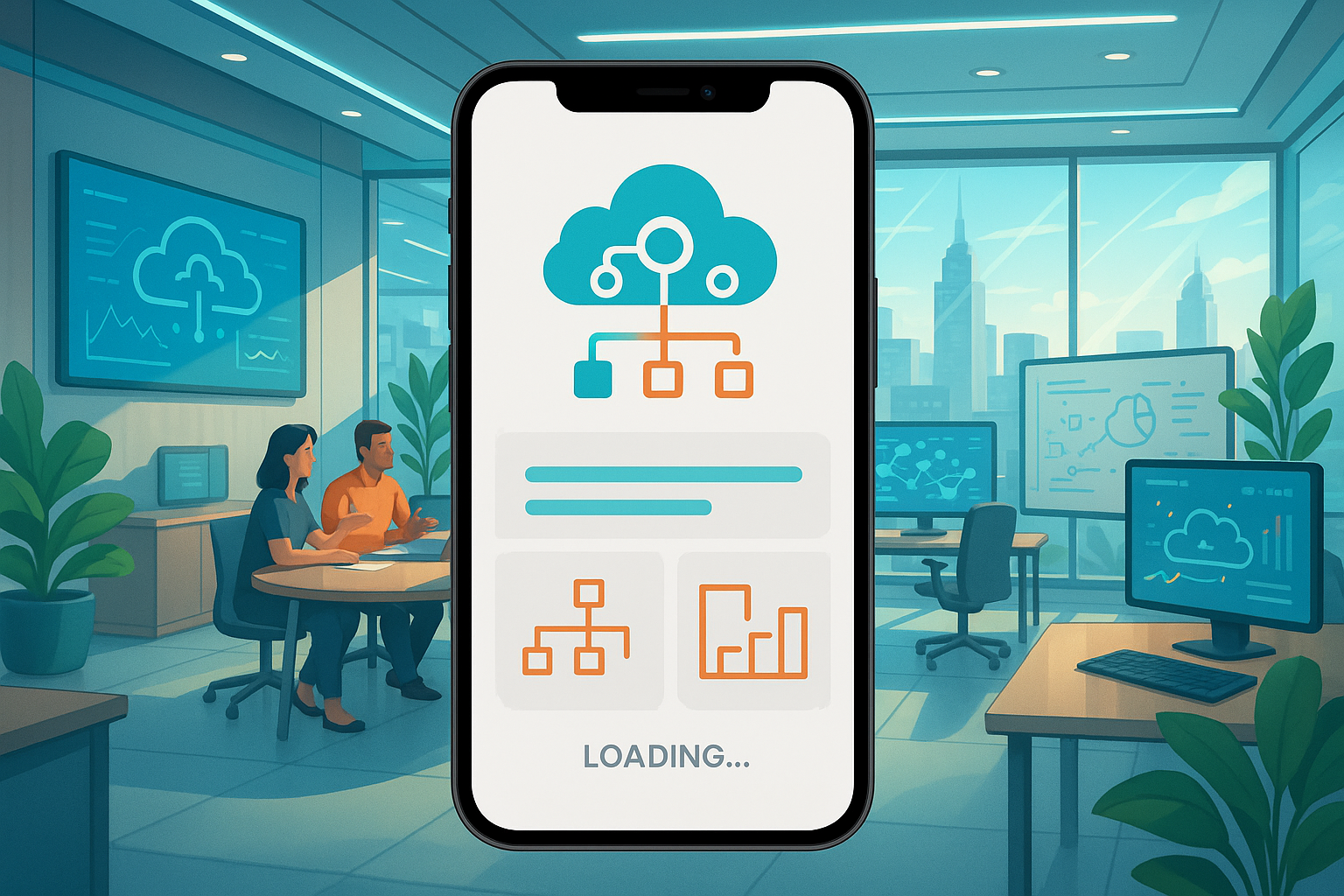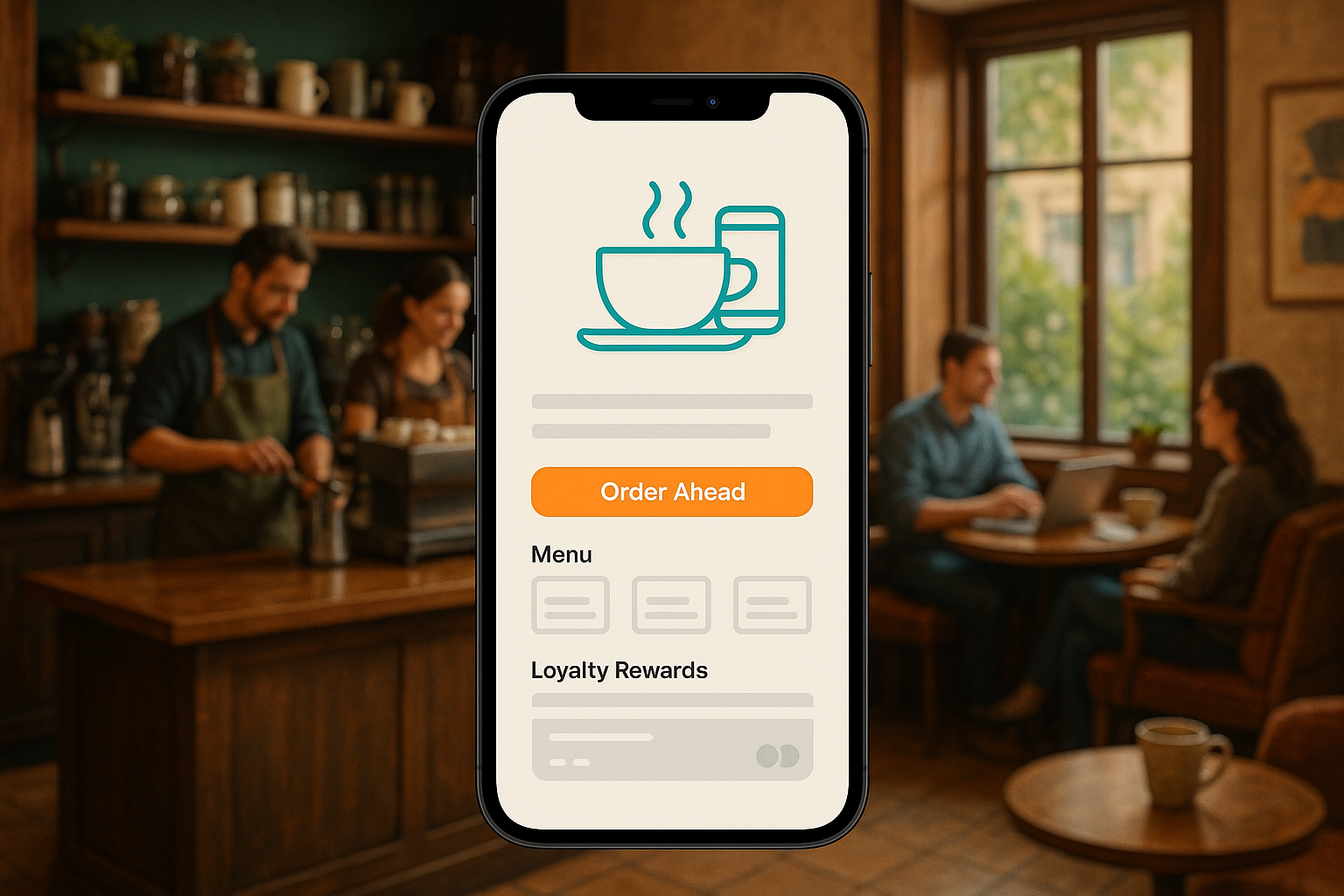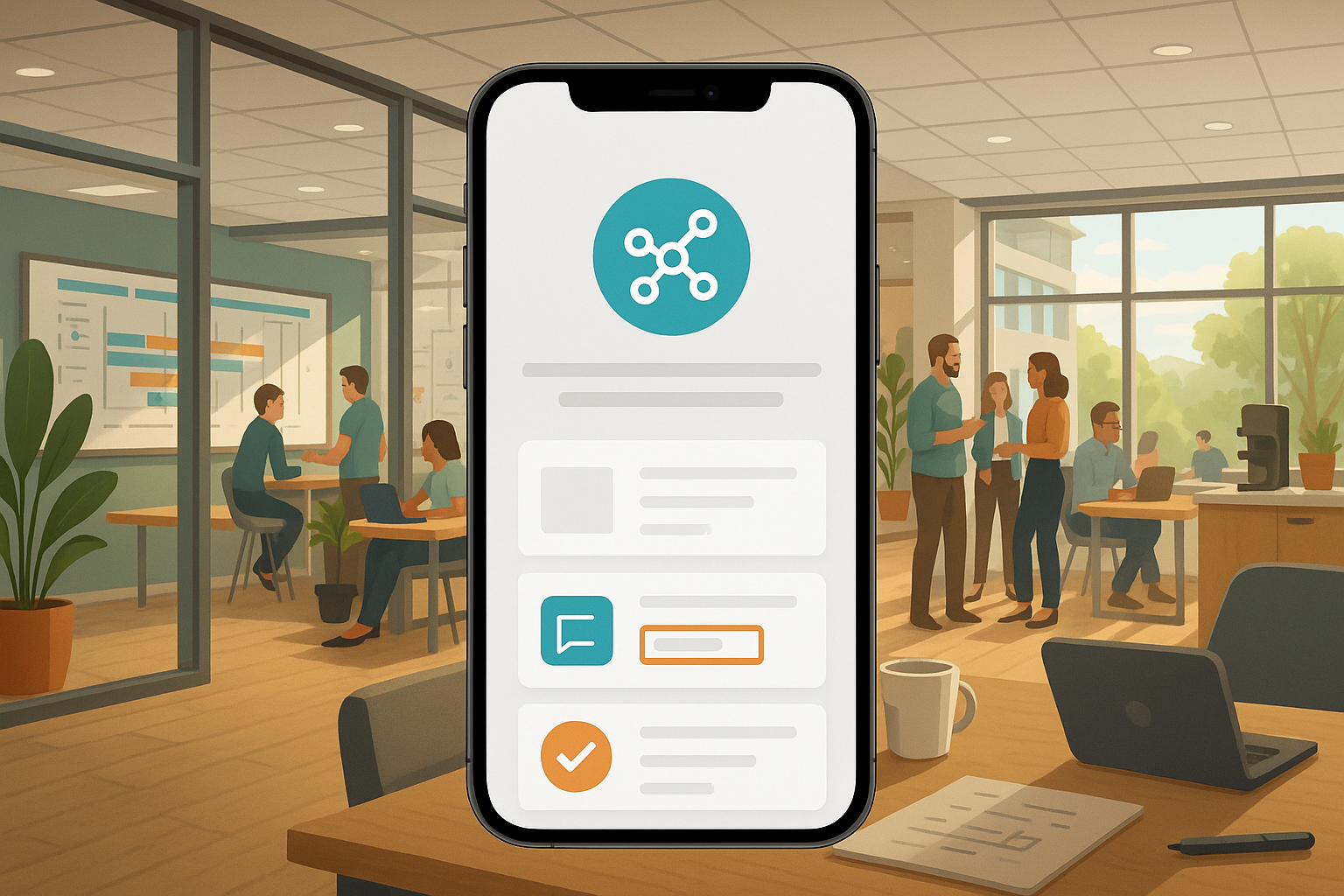Introduction
In today’s mobile-first world, delivering timely, accurate, and engaging content to users across a multitude of devices is no longer a luxury—it’s a necessity. Businesses are constantly searching for ways to manage and publish their content more efficiently. The core of this challenge often lies in the tools they use. A mobile content management system (CMS) app presents a powerful solution, offering a centralized platform to create, manage, and deliver content seamlessly. However, the path to developing such a system is fraught with complexity.
Building a robust CMS app in-house requires a significant investment in time, financial resources, and specialized expertise—resources that many organizations simply do not possess. It involves navigating intricate back-end architecture, ensuring cross-device compatibility, and building intuitive user interfaces for non-technical team members. Attempting this without a dedicated, experienced team can lead to project delays, budget overruns, and a final product that fails to meet business objectives.
This article serves as a comprehensive guide to understanding the world of CMS app development. We will explore what a CMS app is, delve into its core functionalities, and uncover the reasons why building one internally can be so challenging. We will also discuss different types of CMS platforms and provide a list of top-tier development companies that can help bring your vision to life.
As a top US AI-powered mobile app development firm with over two decades of experience, we at MetaCTO have guided countless businesses through the complexities of app development, from concept to launch and beyond. We understand that a successful app is more than just code; it’s a strategic tool that drives growth. In this guide, we will share insights on how partnering with an expert firm like ours can help you build a powerful CMS app that streamlines your workflows, empowers your teams, and delivers exceptional value to your users.
What Is a CMS App?
A mobile content management system, often referred to as a mobile CMS or CMS app, is a user-friendly back-end platform designed specifically for the creation, management, and publication of content to a variety of mobile devices. Its primary goal is to ensure that content is delivered accurately, consistently, and in a timely manner, empowering businesses to communicate effectively with their mobile audience. It acts as the central nervous system for your mobile content strategy, making the entire process smoother and more efficient.
One of the most significant advantages of a mobile CMS is its ability to decouple content management from the application’s underlying code. This means that product and marketing teams can make necessary updates, publish new articles, or change promotional banners without ever needing to interact with a developer or the application’s codebase. This separation of concerns not only accelerates the content lifecycle but also frees up valuable engineering resources to focus on core product development and innovation.
Core Functions of a Mobile CMS
A well-designed mobile CMS is built around three core functions that work in concert to provide a holistic content management experience:
-
Delivering Content: The primary responsibility of any mobile CMS is the delivery, or publishing, of content. It must make it simple for anyone in the organization, even non-technical staff, to publish content to every relevant mobile platform and device. This includes not just smartphones and tablets, but also emerging platforms like smart TVs, watches, and game consoles. An ideal system features automated publishing capabilities, drastically shortening the time between content sign-off and its appearance in the live application.
-
Managing Content: A mobile CMS serves as a centralized hub where all mobile content assets are stored and managed. This centralized nature provides a single source of truth, allowing everyone involved—from writers and editors to translators and marketers—to access and manage every asset and see the progress others are making. This streamlines workflows and enhances collaboration. For instance, the system should allow writers, editors, and translators to work together within a single platform, making the review process faster and easier to manage. To ensure security and proper governance, the back-end area should also include robust access controls and a user hierarchy, letting department leads manage who can view, edit, and publish content.
-
Previewing Content: What you see should be what you get. Before content goes live, it’s crucial to know exactly how it will appear to the end-user. Mobile content management systems must provide marketers, developers, and product managers with a way to preview what their content will look like on different smartphones, tablets, and screen sizes. This preview functionality helps catch formatting issues, ensures visual consistency, and guarantees a polished user experience before publication.
Key Features of an Ideal Mobile CMS
Beyond these core functions, mobile-focused CMS solutions are distinguished by features and capabilities designed to handle the unique nuances of mobile content. An ideal platform should include:
- Visual Editors: To empower non-technical users, a mobile CMS should offer intuitive visual editors. This allows product managers and marketers to create and publish rich, engaging content themselves, without needing to understand code or markup languages.
- Seamless Integrations: A modern CMS does not exist in a vacuum. It must be able to integrate with a wide range of existing tools and applications. This could mean connecting with a primary, enterprise-wide CMS via a two-way API to push and pull translated or edited content. It should also connect with other third-party applications to support a microservices architecture, allowing updates to happen with the click of a button.
- Localization Support: To compete on a global scale, businesses need to deliver content that is contextually accurate for every market. A superior mobile CMS makes it easy to deliver localized content. Ideally, it integrates directly with a Translation Management System (TMS) to automate and streamline the translation and localization workflow.
Ultimately, a mobile CMS empowers anyone in an organization to deliver contextually accurate content at scale, fostering collaboration and accelerating progress through an easy-to-use back-end system that can range from a simple visual editor to a comprehensive project management tool.
Reasons It Is Difficult to Develop a CMS App In-House
While the benefits of a custom mobile CMS are clear, the journey of building one from the ground up is often underestimated. Many businesses are tempted by the prospect of creating a perfectly tailored in-house solution, but they quickly discover that it is a resource-intensive and highly challenging endeavor. Partnering with a specialized mobile app development agency like MetaCTO can help you bypass these hurdles and ensure a successful outcome.
Here are some of the primary difficulties organizations face when attempting in-house CMS development:
1. Resource and Skill Set Limitations
In-house development usually means businesses are stuck with whatever resources they have on staff. Building a successful CMS requires a diverse and highly specialized skill set that most companies do not maintain internally. This includes back-end architects, API specialists, database administrators, front-end developers with expertise in multiple mobile frameworks, and UX/UI designers focused on creating intuitive interfaces for non-technical users. An in-house team may simply not have the necessary combination of skills, leading to a product that is either incomplete, insecure, or difficult to use.
2. High and Often Unpredictable Costs
The financial investment required for in-house CMS development extends far beyond employee salaries. Building a successful CMS requires a full-time, dedicated team. Beyond that, organizations must account for extra financial resources for development environments, specialized software licenses, server infrastructure, and ongoing maintenance. These costs can quickly add up, often exceeding initial budget projections. Without the experience of having built similar systems before, it’s difficult to accurately forecast the total investment, leading to financial strain and potential project failure.
3. Lack of Flexibility and Scalability
When a company dedicates its full-time internal resources to a single, large-scale project like a CMS, it loses agility. This rigid structure makes it much harder to adjust to changing requirements or pivot based on market feedback. As new devices, operating systems, or content needs emerge, the in-house team may struggle to adapt quickly. In contrast, an experienced development agency is built for flexibility, with the ability to scale resources up or down as the project demands, ensuring the final product can evolve with your business.
At MetaCTO, we provide the strategic oversight and technical expertise needed to navigate these challenges. With services like our Fractional CTO offering, businesses can gain access to high-level technical leadership without the expense of a full-time executive. We help you build a technology roadmap that avoids the common pitfalls of in-house development, ensuring your project is delivered on time, within budget, and with the expert guidance necessary for long-term success.
Different Types of CMS Apps
While the term “mobile CMS” covers a broad range of systems, one of the most important distinctions in modern content management is the architectural approach. The most prominent and flexible type of mobile content management system today is the headless CMS. Understanding this model is key to building a future-proof content strategy.
The Headless CMS: A Device-Agnostic Approach
A headless CMS for mobile is a specific type of mobile content management system that fundamentally changes how content is stored and delivered. In a traditional CMS, the back-end (where content is created and stored) and the front-end (the presentation layer or “head” that displays the content) are tightly coupled. A headless CMS severs this connection.
A device-agnostic headless mobile CMS separates the back-end content repository from the front-end layer. These two components are then linked by an Application Programming Interface (API). Content is created and managed in the back-end and then served via the API to any front-end application that requests it.
This architectural separation provides several powerful advantages:
- Ultimate Flexibility: With a headless CMS, you can make changes to the front-end display at any time without impacting the content stored in the back-end. This means you can redesign your app, launch a new website, or create an experience for a new device without having to migrate or re-format your content.
- True Omnichannel Delivery: The headless approach ensures users can create and deliver experiences regardless of the end user’s device or operating system. The same content stored in the CMS can be seamlessly published to a native iOS app, an Android app, a website, a smart TV, a wearable watch, or even a game console.
- Future-Proofing: A headless CMS is often framework-agnostic. Because it delivers raw content data via an API, front-end developers are free to use any technology or framework they choose (like React, Vue, or Swift) to build the user experience. As new technologies emerge, you can adopt them for your front-end without being locked into the technology of your CMS.
- Support for Microservices: A modern CMS should connect with a wide range of third-party applications, either through native integrations or APIs. The headless model is perfectly suited to support a microservices architecture, where different parts of your technology stack operate as independent, interconnected services.
By adopting a headless architecture for your mobile CMS, you create a flexible and scalable content foundation that can adapt to the ever-changing digital landscape. It empowers your organization to deliver the right content to the right user on the right device, now and in the future.
Cost Estimate for Developing a CMS App
One of the most pressing questions for any organization considering a new technology solution is, “What will it cost?” For custom CMS app development, there is no single, fixed price. The cost is highly variable and depends on a wide range of factors, including the complexity of the features, the chosen technology stack, and, most importantly, the development approach you take.
The in-house development route, as discussed, carries significant costs that are both direct and indirect. These include the salaries of a full-time development team, expenditures on hardware and software, and the opportunity cost of pulling those resources away from other business-critical initiatives.
Outsourcing to a development company, on the other hand, can provide a much clearer and often more efficient financial path. The market for CMS development services is broad, with firms offering a wide range of pricing models. For example, some companies like PixelCrayons offer CMS development services for projects with budgets under $5,000. While this may be suitable for very simple projects, a robust, enterprise-grade mobile CMS with features like localization, user hierarchies, and complex integrations will naturally require a more substantial investment.
The key to managing costs effectively is to partner with a firm that prioritizes a strategic, value-driven approach. At MetaCTO, we specialize in helping businesses launch powerful applications efficiently. Our Rapid MVP Development service is designed to bring a functional product to market in 90 days or less. This allows you to test your core concept, gather real user feedback, and validate your strategy on a tight budget and timeline. By focusing on the most critical features first, you can control costs while still building a foundation that is ready to scale. This iterative approach ensures that your investment is always aligned with tangible business outcomes.
Top CMS App Development Companies
Choosing the right development partner is the single most important decision you will make when building a custom CMS app. A great partner brings not only technical expertise but also strategic guidance, a proven process, and a commitment to your success. The following list of top CMS development companies, prepared based on research parameters like client ratings on Clutch and GoodFirms, company portfolios, and successfully delivered projects, provides a look at some of the leading players in the industry.
1. MetaCTO
As an AI-enabled mobile app development agency with over 20 years of experience, we at MetaCTO are experts at transforming complex ideas into market-leading applications. We have successfully launched over 120 projects and earned a 5-star rating on Clutch by providing a comprehensive partnership that extends from initial strategy to launch and beyond.
We believe that building a great app requires a holistic approach that covers every stage of the product lifecycle. Our process is designed to de-risk development and maximize your return on investment:
- Validate: We help you turn your idea into a Minimum Viable Product (MVP) quickly, allowing you to test the market, collect real user feedback, and secure investor funding on a tight budget.
- Build: We handle the entire process—from design and architecture to development and launch—ensuring your CMS app is robust, scalable, and delivers a smooth experience from day one.
- Grow: Launching is just the beginning. We use analytics and A/B testing to optimize user onboarding, engagement, and retention, helping you build a loyal user base.
- Monetize: We work with you to figure out the best way to turn your app into a revenue-generating asset, whether through subscriptions, tiered access, or other models.
- Evolve: As your business scales, we ensure your app evolves with it, upgrading your technology to keep you competitive in a fast-moving market.
Our team provides the deep technical partnership needed to build a technology and AI Development roadmap that increases profit and valuation. For a project as critical as a custom CMS app, you need more than just coders; you need a strategic partner.
2. Chop Dawg
Ranked first on the original source list, Chop Dawg is a leading CMS development company that provides top-notch services to businesses of all sizes. With a strong focus on client satisfaction, their team of skilled developers delivers high-quality, custom CMS solutions tailored to each client’s unique needs. Chop Dawg’s services include CMS architecture, development, integration, and ongoing support. They have expertise working with a wide array of open-source CMS platforms, including WordPress, Drupal, Joomla, and Kentico, and provide maintenance to ensure their clients’ platforms are always up-to-date and performing optimally.
3. ValueCoders
Launched in 2004, ValueCoders is a trusted name in the world of CMS development and a preferred IT outsourcing organization. With over 18 years of experience, they have offered groundbreaking CMS services to top organizations worldwide by creating enterprise-grade custom content management systems. ValueCoders empowers organizations to impact digital change by ensuring that cost, time, and programming enhancements are streamlined. Clients can appoint a skilled development team from their pool of over 450 experts to obtain a full range of IT-based services and solutions.
4. PixelCrayons
Founded in 2004, PixelCrayons is recognized as one of the best and most promising CMS development companies. Located in India, they offer end-to-end digital solutions to enterprises, startups, and digital agencies, having served over 6,800 customers from 38+ countries. PixelCrayons is known for its DevOps improvement process, SLA-driven methodology, and on-time delivery. They stand out for offering CMS development support for projects with budgets under $5,000 and having the lowest hourly rate on the source list. With one of the best client retention rates in the industry (97%+) and a 100% money-back guarantee, they provide a compelling option for budget-conscious projects.
5. WPWeb Infotech
WPWeb Infotech is a highly reputable and proficient CMS development company specializing in delivering top-notch web development solutions. They possess a deep understanding of various CMS platforms, including WordPress, Drupal, Shopify, and Magento, which enables them to create dynamic and scalable websites and web applications. Their skilled team develops custom CMS solutions that are not only visually appealing but also user-friendly and highly functional. Employing a customer-centric approach, WPWeb Infotech utilizes the latest industry best practices to ensure the websites and applications they develop are responsive, intuitive, and optimized for performance across different devices.
6. Capital Numbers
Capital Numbers is a D&B accredited, ISO 9001, and 27001 certified global solutions provider with over 400 in-house, full-time specialists. With more than ten years of experience, they serve clients across the globe, including major brands like Reuters and Condé Nast, as well as hundreds of small businesses and Silicon Valley founders. Their team not only manages clients’ CMS platforms but also optimizes and enriches them, taking care of everything related to CMS software customization and management.
7. Cyber Infrastructure Inc (CIS)
With over 14 years of experience in the IT sector, Cyber Infrastructure Inc (CIS) is a well-known name for providing exceptional technology services. They have consistently delivered optimal solutions to a broad global customer base by following globally recognized standards and the latest technological innovations. CIS provides customized solutions to a wide range of industries, and their outstanding services include CMS development, application development, business intelligence and analytics, and front-end design, all aimed at helping businesses achieve their goals.
8. Rave Digital
Rave Digital is a team of skilled, certified software developers offering customized web and mobile services. As a top-rated Magento agency, they have built a reputation of excellence since 2008 by continuously offering innovative, customer-dedicated eCommerce solutions to B2B merchants globally. Rave Digital caters to SMBs by acting as their technology providers and delivering end-to-end IT solutions to the corporate, government, and non-profit sectors. Their specialties include CMS, CRM Services, eCommerce Solutions, and Mobile App Development.
9. Iflexion
Founded in 1999, Iflexion is a global IT solutions company with over 400 employees, serving customers from SMBs to Fortune 500 companies in more than 30 countries. They have extensive experience delivering advanced web and mobile solutions in areas such as web portals, digital learning, enterprise mobility, and digital content distribution. Their clients include all types of enterprises, digital agencies, and startups.
10. IDS Logic
IDS Logic is a leading outsourcing company based in India with sales offices in the UK and the USA. They provide a range of web-based services, including CMS development, software product development, website design, and internet marketing, for clients worldwide. Operating from their development center in India, their specialties include CMS development, web development, mobile apps, and document management systems.
11. Xicom Technologies
Founded in 2002, Xicom Technologies is a recognized, ISO 2009-certified IT company specializing in CMS web development services. With a highly skilled and dedicated team of over 300 developers, they have empowered more than 1,500 brands, startups, and enterprises. Their simple mantra is to provide client-centric and business development solutions by deploying the latest technology and proven functionality. Their services include CMS development, eCommerce solutions, and custom mobile app development.
12. Clarion Technologies
Incepted in 2000, Clarion Technologies is a trusted name among CMS website development companies, having served over 1,000 customers worldwide. With a team of more than 400 developers, they offer stable development solutions that cater to clients’ business needs, irrespective of industry or location. Clarion allows clients to hire experienced developers across various industries to get the best possible CMS solution for their project.
13. Zenesys
Established in 2011, Zenesys is a renowned CMS development company that provides exceptional services to businesses of all sizes. With a strong commitment to client satisfaction, their team of highly skilled developers specializes in delivering tailored CMS solutions. Their comprehensive range of services includes CMS architecture, development, integration, and ongoing support. Zenesys has expertise in various open-source CMS platforms like WordPress, Drupal, and Joomla, and also provides comprehensive maintenance and support services to ensure client platforms remain secure and optimized.
Conclusion
Developing a mobile content management system is a strategic imperative for any business serious about its mobile presence. A well-executed CMS app streamlines workflows, empowers non-technical teams to manage content with ease, and ensures a consistent, high-quality experience for users across an ever-expanding array of devices. As we’ve explored, this system is far more than a simple tool; it is the backbone of an effective mobile content strategy, with core functions for delivering, managing, and previewing content, and advanced capabilities offered through architectures like the headless CMS.
However, the path to creating such a system is filled with significant challenges. The high costs, specialized skill requirements, and rigidity of in-house development often make it an impractical and risky endeavor. The smarter path is to partner with an expert who has navigated this journey many times before. By reviewing the top development companies, it’s clear that there is a wealth of expertise available to help you build the right solution for your needs.
Building a powerful, scalable, and intuitive CMS app requires a partner that offers more than just development services—it requires a partner dedicated to your long-term success.
If you’re ready to build a CMS app that will transform your content strategy and drive your business forward, we are here to help. Talk with a CMS app development expert at MetaCTO today to build a technology roadmap that turns your vision into a reality.






